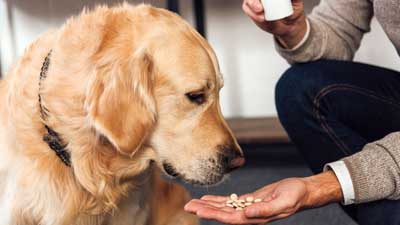- Size
- Smallest
- Small
- Small to Medium
- Medium
- Large
- Giant
- Characteristics
- Smartest
- Hypoallergenic
- Fluffy
- Best Guard
- Best Family
- Best for Kids
- Low Shedding
- Healthiest
- Police Dogs
- Most Calm
- Quietest
- Color
- White
- Black
- Grey
- Brown
- Blue
- Red
- Coat
- Hairless
- Short
- Long
- Origin
- Japan
- China
- Australia
- Germany
- Italy
- United States
- France
- Group
- Hound
- Terrier
- Herding
- Toy
- Working
- Sporting
What Happens If A dog Eats Rat Poison?

Rat or mouse poisons, also known as rodenticides, are commonly used household chemicals used to lethally eliminate pesky rodents from the home. They are formulated as pellets, blocks, or liquids with a flavored sugary base. Often placed in areas that are accessible to small rodents, the attractive flavors and location also make rat poisons available and desirable to dogs.
Unfortunately, there are no rat poisons on the market deemed "pet safe" at this time. In addition to eating the poison itself, dogs who eat rodents who have been poisoned may also become secondarily poisoned.
Symptoms
The timing and severity of poisoning in dogs depend on the type and amount of poison ingested. Symptoms can begin anywhere from minutes to days after consumption and include weakness, collapsing, vomiting, lethargy, tremors, and difficulty breathing. Be aware of signs of inappropriate internal bleeding such as coughing blood, bleeding from the gums, pale gums, bloody nose, blood in stools and/or urine, and bruising. Because many rat poisons are brightly colored, know that brightly colored stools (blue, green, teal, pink, purple) are also a sign your dog has consumed poison.
Medical Issues
From a medical standpoint, different poisons affect animals in different ways. Some are anticoagulants and cause extensive internal bleeding while others affect the kidneys, brain or central nervous system, and/or GI system. Essentially, multiple organs will likely be severely damaged should your dog consume rat poison. While you may not notice symptoms right away, the damage is building up and time is of the essence to effectively treat your animal. This can be life-threatening.
Treatment
If you witnessed your pet consume rat poison or suspect it did due to the above symptoms, call your vet immediately. This is an emergency. Along with your pet, take the packaging from the rat poison with you to the vet. The name and brand of the chemical along with when and how much you suspect your dog consumed will be pertinent information. Your vet will likely attempt to induce vomiting and then administer activated charcoal to your dog. Further examination and tests will allow your vet to decide what further treatment is needed. Vitamin K may be utilized if your dog has internal bleeding as this reverses the effect of anticoagulant poisons. IV medications, blood transfusions, steroids, and hospitalization may be necessary.
How To Prevent Pet Poisoning
Consider using non-chemical pest-control measures including professional pest control companies or traps. If you must use rat poison on your premises, keep any unused rat poisoning in a locked cabinet out of reach of pets. When utilizing rat poisoning in the home, place it in an area completely inaccessible to your pet. If that is not possible, sequester your pet to another room for a couple of days until your pest control protocol is complete. When walking your dog, be sure to keep him/her in your sights to avoid any accidental ingestion from neighbors or city rodenticide treatments. Always supervise your pet on trash day, as disposed of rat poisoning could be sniffed out easily.
References
- [1] ^ The Spruce Pets: Rat Poisoning in Dogs
You May Also Like
 Dog HealthCan humans Get Parvo from Dogs?
Dog HealthCan humans Get Parvo from Dogs? Dog HealthHow Long Does It Take A Dog To Show Signs Of Parvo?
Dog HealthHow Long Does It Take A Dog To Show Signs Of Parvo? Dog HealthVaccines for Dogs: Here's Everything You Need to Know About It
Dog HealthVaccines for Dogs: Here's Everything You Need to Know About It Help & Advice10 Tips for New Dog Owners
Help & Advice10 Tips for New Dog Owners Dog HealthCan I Give Human Amoxicillin To My Dog?
Dog HealthCan I Give Human Amoxicillin To My Dog? Dog HealthWhat Happens If A Dog Eats Amoxicillin?
Dog HealthWhat Happens If A Dog Eats Amoxicillin?